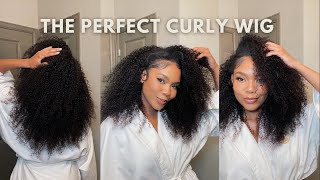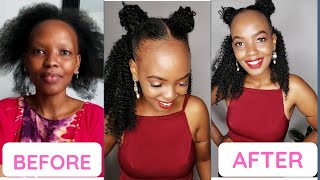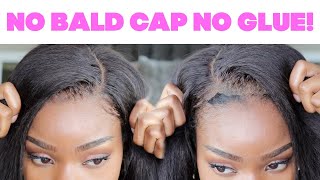Can You Teach Your Kids To Love Natural Hair If You Are Relaxed?
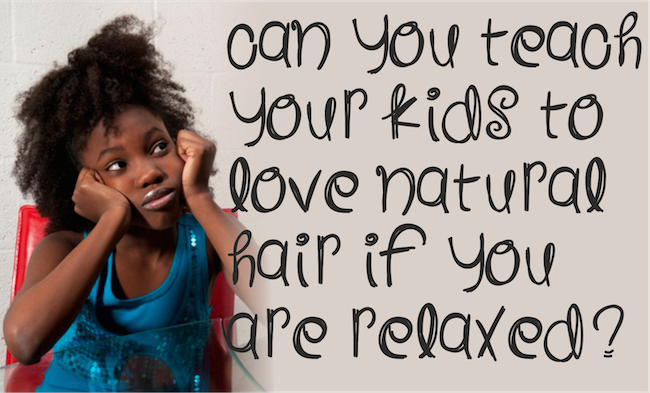
I was going about my business recently when I saw the caption on a T-shirt: “I don’t need a relaxer; my hair is not stressed out”. I laughed and thought to myself, how clever, yet the more I thought about it, the more potency the words had.
Countless black women have been seduced by the images of the slick straight hair that gives you the thrill of having the wind blow through your hair and tickle your scalp; being able to run your fingers through soft smooth tresses unhindered by kinks and knots, just like in the movies. I know because I have been at that point too many times to count.
It becomes more enticing on bad hair days when those edges just won’t cooperate or when you touch your hair and cringe because the feel of it is comparable to steel wool.
Despite the allure, I am still natural but it might not have been that way had my mother not laid the gauntlet down and categorically stated, “No chemical processing of your hair. You were born with it so you better learn to love it.”
How I hated that, but years later I began to embrace my hair and India Arie’s “I Am Not My Hair” became my anthem. It seems this song strikes a chord with those who opt to relax their hair as well, since the song takes no sides in the hair debate. Many moms are desirous of maintaining their daughters’ natural hair, though they themselves choose to get a relaxer.
Which brings me back to the question: can you teach your kids to love their natural hair if you are relaxed?
The natural hair movement has come a far way judging by the substantial 12.4 percent decline in the sales of relaxers between 2009 and 2011. Still, a significant number of black women continue to get relaxers. Much debate has sparked from this with many advocates of the natural hair movement saying that getting a relaxer is an indication that you are still mentally enslaved and have not yet embraced your true cultural identity.
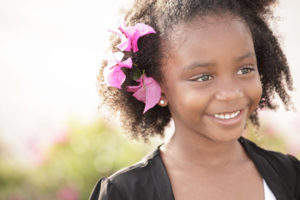 Some feel it is an attempt to segregate your hair from yourself, in an effort to disassociate yourself from the image of an eighteenth century black slave; wild, unkempt, nappy-headed. Some question the message that the act of relaxing your hair sends to the daughters of mothers who get a perm.
Some feel it is an attempt to segregate your hair from yourself, in an effort to disassociate yourself from the image of an eighteenth century black slave; wild, unkempt, nappy-headed. Some question the message that the act of relaxing your hair sends to the daughters of mothers who get a perm.
For the most part, psychologists believe that much of what black people do in terms of how we live our lives and view ourselves, are shaped by the culture of slavery that dictated what beauty is. The truth is that while many of us celebrate freedom of expression, we seem to be captives of these ideals which say that straight hair is beautiful and black hair in all its natural glory is not.
Since the boom of the natural hair movement in 2009, many women have been embracing the concept that our hair is beautiful and versatile. While it is the case that many cannot seem to divorce their relaxers, they have hair crushes and are willing to grow their children without subjecting them to a life of relaxers.
As it is with many other things, it may be possible for mothers to teach their kids how to love natural hair even though they themselves are relaxed; the operative word here is possible, but how probable is it?
While some mothers have indicated their desire to protect their young daughters from the harsh chemicals in the products they themselves opt to continue relaxing their hair. It may be argued that these mothers are sending mixed signals to the little ones, for they may wonder “How is it that mommy tells me my hair is beautiful when mommy doesn’t even wear her hair like mine?”
While the child may not voice these musings, it may very well represent a contradiction to her. Some little girls cannot wait for the day when they will be old enough to get their hair just like mommy’s. This, of course, is assuming that the mothers have actually grown to love natural textures and want to dedicate time to ensuring that their daughters know that their hair is not inferior to their Caucasian or Asian counterparts.
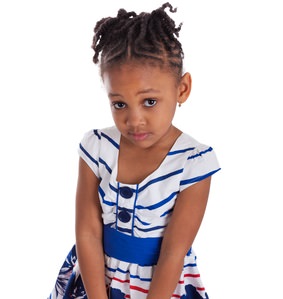 Several horror stories involving mothers bad mouthing their child’s hair have surfaced. Some of us have even witnessed this in public.
Several horror stories involving mothers bad mouthing their child’s hair have surfaced. Some of us have even witnessed this in public.
They bemoan the fact that their child didn’t get any of the “good hair” and anxiously await the day when they can wax on some hair relaxer to “fix the problem”.
These mothers either get stressed out thinking about all the time it will take to “fix” the child’s hair, or become overwhelmed.
It goes without saying that a child with such a mother may be led to believe that somehow she is short of something; the thing that would make her beautiful; straight hair.
Mothers play an important role in any child’s life. They are our first teachers, and in the early stages of development a child learns by observing.
A little girl will want to look like mommy does from head to toe, for this is where she gets her first sense of style.
Patterning their parents is the goal of most children from infancy through to the school age. How probable is it then, that a mom who is relaxed will be able to successfully teach her natural haired child to embrace her hair when the child cannot pattern mom?
Might it suggest to the child that black hair must be de-kinked in order to achieve the look of sophistication? Mothers may attempt this feat by trying to surround their daughters with images of people who rock their natural textures.
This visual stimulus is good but in the greater scheme of things, children need tangible references to make a connection with what they are being told and shown. At the end of the day it all comes down to personal choice, but if you are serious about teaching your child to embrace the beauty of her natural texture, wouldn’t it be best to lead by example?
Does your relaxer send a counter-productive message to your kids which reads: “Black hair is stressed so it needs to relax”?

